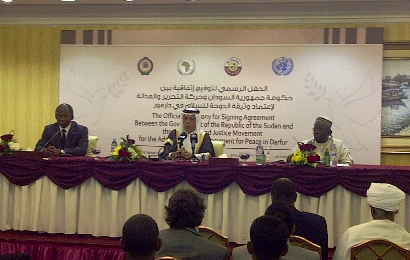Darfur mediators defend Doha deal and urge rebel groups to join peace
July 17, 2011 (DOHA)– Darfur peace mediators said the peace agreement signed in Doha on Thursday between the Sudanese parties is a viable pact and urged the other rebel groups to follow yesterday’s example and reach peace agreements.

Burkina Faso’s foreign minister and former Joint Chief Mediator Djibril Bassolé, Qatari state minister for foreign affairs Ahmed bin Abdullah Al-Mahmoud and the UNAMID chief Ibrahim Gambari held Friday a press conference in the Qatari capital where they appealed to the other rebel groups to work for peace in Darfur.
The Justice and Equality Movement (JEM) demanded to open talks on the seven chapters of the peace document while the Sudan Liberation Movement (SLM) led by Abdel Wahid Al-Nur refuses to negotiate with Khartoum saying only a regime change can achieve a comprehensive peace in Sudan.
The peace deal was described as partial and paving the way for the government to exclude the other groups. The opponents of the Doha pact also said it is doomed to failure just like Abuja peace agreement of 2006.
Advocating the LJM-Sudan government deal, Bassolé said Thursday’s agreement is viable because it is based on a “consensual document” for peace in Darfur. He further said the Doha process is “participative” because it includes all the stakeholders besides the rebels.
The former mediator who becomes a member of the follow-up committee pointed out that the framework document is “open” for the other groups which did not yet signed an agreement and it does not exclude them.
Al-Mahmoud who co brokered the process with Bassolé stressed that what is needed at the present stage is a serious political will of the parties to reach a comprehensive and inclusive peaceful settlement for the conflict.
He further warned that if the lack of determination persists during the upcoming period “we can not continue our efforts to resolve the conflict”. Asked if the three months’ delay accorded to JEM to finalize a peace agreement is enough, the minister affirmatively said “yes it is enough and even more than enough”.
JEM spokesperson Gibreel Bilal Adam stigmatized the agreement in a press statement released on Sunday saying it gives Khartoum a green light to continue its military operations in Darfur.
He further stressed “We will not be part of any agreement that did not diagnose the root causes of the Sudanese problem.”
Asked to identify the issues that the rebel group see as crucial to negotiate, JEM chief negotiator Ahmed Tugud told Sudan Tribune that they demand to hold talks on the human rights and fundamental liberties, the compensations, the wealth sharing and the power sharing including the administrative status of the region, the security arrangements and the reconciliation and justice particularly the hybrid courts.
Tugud who was speaking after the press conference added that all these issues should be tackled in direct talks with Khartoum before to sign any peace agreement, otherwise JEM will move out of the peace forum.
Bassolé who was involved in different peace processes in countries like the Niger and the Côte d’Ivore said he noticed in the case of Darfur that rebel groups do not coordinate their positions and seek to obstruct each other when it comes to making peace.
Al-Mahmoud from his side said the Sudanese parties have to sit on the negotiating table and seek to find a deal to end the conflict based on the Doha framework.
He said the mediation was pleased by the support of the US envoy for Sudan, Princeton Lyman, to the process and the pact inked by the Sudanese government and LJM rebels disclosing that Washington will be part of the follow up committee which will seek to bring all the remaining parties to negotiate peace agreements.
In this regard Bassolé unveiled the follow-up committee will hold a first meeting next September to assess the implementation of the 14 July agreement and discuss ways to resume talks and include all the rebels in the process.
The US State Department spokesperson Mark Toner welcomed last Thursday the Sudan-JLM deal and stressed “We will continue to press those armed movements which refuse to participate in the peace negotiations — particularly the Sudan Liberation Army factions of Abdelwahid Nur and Minni Minnawi — to engage fully in the peace process”.
The American diplomat also urged Sudanese government to “affirm its openness” to further negotiations on a comprehensive peace in Darfur.
In New York, the UN chief welcomed the signing of an agreement between the government and LJM rebels for peace in Darfur. He further urged the JEM and the two factions of the Sudan Liberation Movement (SLM) led by Al-Nur and Minnawi to join the peace process.
(ST)

Aleu
Darfur mediators defend Doha deal and urge rebel groups to join peace
If guys thinks you will trust Khartoum government that is fine, but I am strongly belief that, your peace agreement is same as the Addis Ababa peace agreement for Southern Sudanese. I like you guys to have all kinds of human rights unfortunately, under Khartoum regime I do not have any clue.
Khartoum government have tried very hard to destroying the 2005 peace agreement if the SPLM were not strong in all terms, we wouldn’t witness the South Sudan independence day on July9,2011. I wish you guys will find something but I do think Khartoum government would like to accept any papers signs for peace agreement and when you guys went inside then, the process for peaceful will change to gimmick rule.